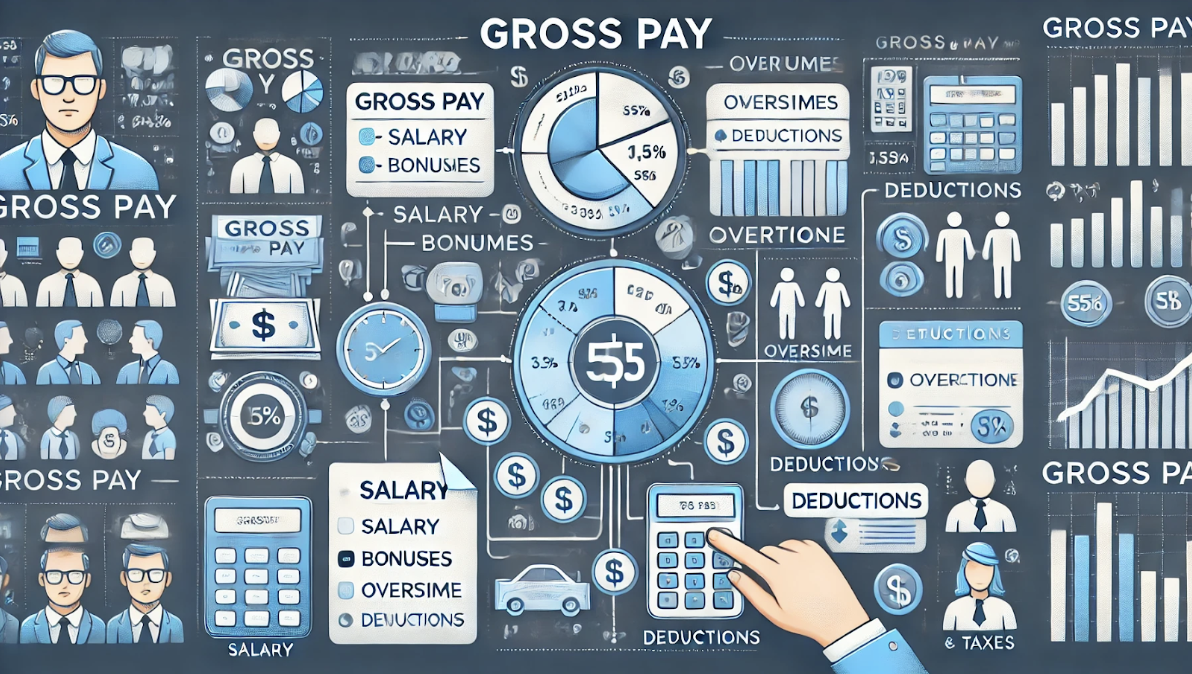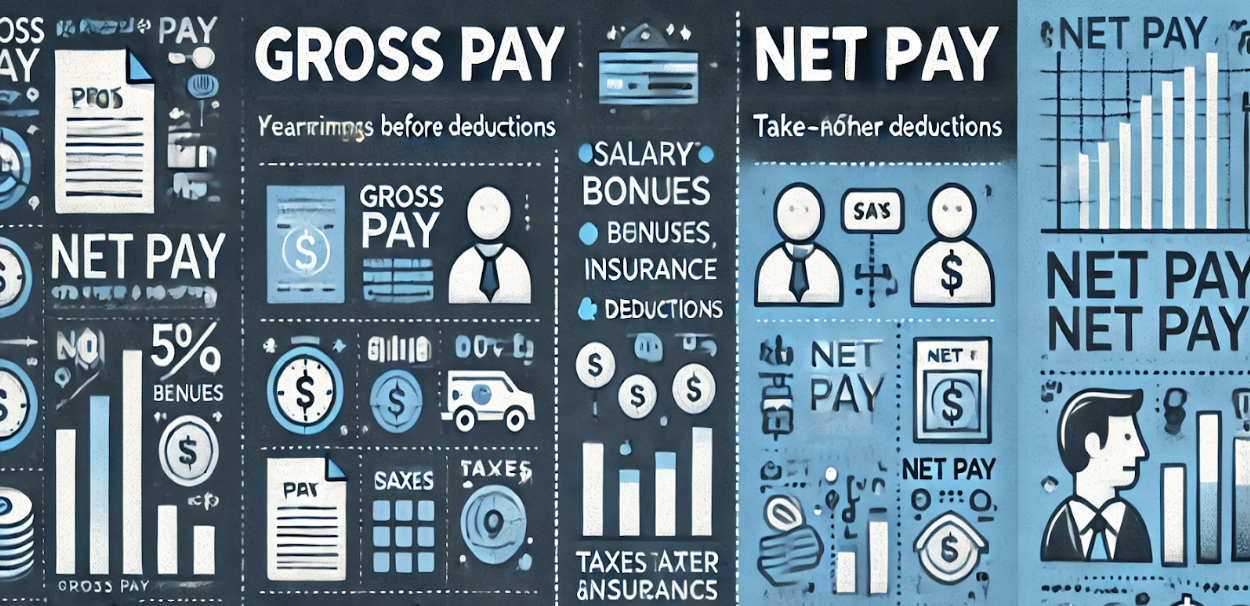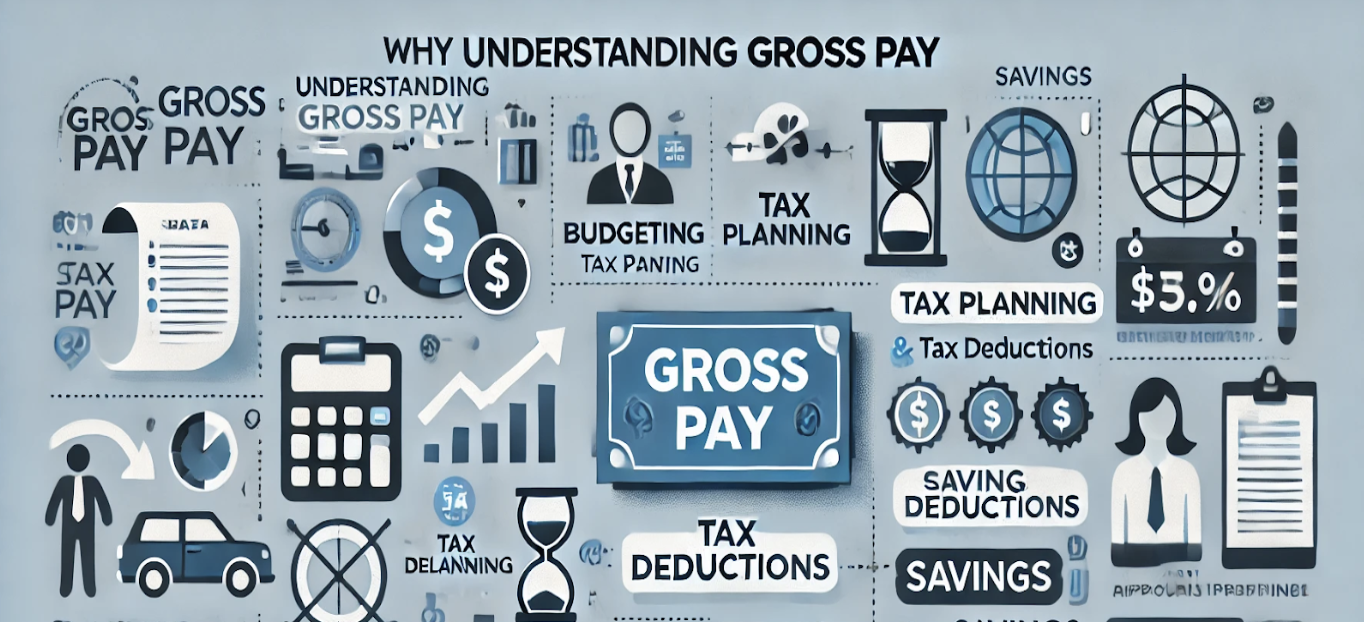What is Gross Pay? A Complete Guide

“Understanding your paycheck is the first step to financial awareness and smart money management.”
What is Gross Pay, and how does it affect your total earnings? When reviewing your paycheck, you’ve likely seen terms like gross pay, net pay, and deductions. Do you still find it difficult to understand these concept? You are in the right place to get your answers.
This article will provide a comprehensive breakdown of gross pay, its calculation, and how it differs from net salary. If you’ve ever wondered why your take-home pay is lower than your salary, you also need to know how Bycard can help you manage your funds well, this guide willshade more light on all your questions.
What is Gross Pay?

Gross pay is the total amount of earnings an employee receives before any deductions such as taxes, insurance premiums, and retirement contributions are subtracted. This includes wages, salaries, bonuses, commissions, and overtime pay.
For example, if you earn a salary of $60,000 per year, your gross salary is $60,000 before taxes and deductions. However, your net pay (take-home pay) will be lower due to withholdings.
Why is Gross Pay Important?
- It impacts loan applications and financial planning
- It determines taxable income before deductions
- Employers use it to calculate benefits and overtime pay.
Gross Pay Calculation – How is it Determined?
Calculating Gross Pay for Salaried Employee
For salaried employees, gross pay is calculated as:
Annual Salary ÷ Number of Pay Periods = Gross Pay Per Paycheck
- Example:If you earn $60,000 annually and are paid monthly, your gross pay per paycheck is: $60,000 ÷ 12 = $5,000 per month
Calculating Gross Pay for Hourly Employees
For hourly employees, gross pay is calculated as:
(Hourly Wage × Hours Worked) + Overtime Pay + Bonuses = Gross Pay
- Example:If you earn $20 per hour, work 40 hours per week, and receive 10 hours of overtime at time-and-a-half ($30 per hour), your gross pay is: (40 × $20) + (10 × $30) = $800 + $300 = $1,100 for the week

A card that takes the Lead

Factors Affecting Gross Pay

Several key elements impact an employee’s gross pay, influencing their overall earnings before deductions. Understanding these factors can help individuals optimize their salary structure and negotiate better compensation.
- Base Salary or Hourly Wage: This is the foundational pay rate agreed upon between an employee and an employer. Salaried employees receive a fixed amount per year, while hourly employees are paid based on the number of hours worked.
- Overtime Pay(usually 1.5x the hourly rate): Employees who work beyond the standard work week (typically 40 hours) may be eligible for overtime pay. In many cases, this is calculated at one and a half times the standard hourly wage.
- Bonuses and Commissions: Performance-based earnings such as year-end bonuses, sales commissions, and incentive pay contribute to gross wages. These additional earnings vary depending on company policies and individual performance.
- Allowances (Travel, Housing, etc.): Some employers provide non-taxable or taxable allowances for travel, housing, meals, or other work-related expenses, increasing an employee’s total gross pay.
- Other Earnings (Stock Options, Profit-Sharing): Some employees receive equity-based compensation, such as stock options or profit-sharing plans, which can significantly enhance their gross earnings over time
Gross Pay vs. Net Pay – What’s the Difference?
What is Net Pay?
While gross pay is the total earnings, net pay is the amount an employee actually takes home after deductions. It is calculated as: Gross Pay – Deductions = Net Pay
Key Differences Between Gross Pay vs. Net Salary Common Deductions from Gross Pay

Understanding deductions from gross pay is essential for managing finances effectively. These deductions reduce an employee’s take-home pay (net pay) and are categorized as mandatory (legally required) and voluntary (opted in by employees).
- Taxes: Federal, State, and Local income taxes.
The largest deduction from gross pay, income taxes vary based on salary, location, and applicable tax brackets. Employers withhold these taxes on behalf of the employee and remit them to the government.
- Social Security & Medicare (FICA): Payroll tax deduction
The largest deduction from gross pay, income taxes vary based on salary, location, and applicable tax brackets. Employers withhold these taxes on behalf of the employee and remit them to the government.
- Retirement Contributions: 401(k) or pension contributions
Many employees contribute to a 401(k) plan, IRA, or pension fund to prepare for retirement. Some employers offer matching contributions, which increase long-term savings but lower taxable income.
- Health Insurance Premiums: Medical, dental, and vision coverage
Employees enrolled in employer-sponsored health, dental, or vision insurance have pre-tax premiums deducted from gross pay. These deductions lower taxable income and provide essential coverage.
- Other Deductions: Union dues, student loan repayments, garnishments
Union dues: Paid by employees who are part of labour unions to support negotiations and benefits.
Student loan repayments: Some employers deduct student loan payments directly from payroll.
Garnishments: Court-ordered wage garnishments for child support, back taxes, or unpaid debts are taken from gross pay before reaching net pay.
Why Understanding Gross Pay Matters
- Helps with Tax Planning – Knowing your gross wages allows better income tax filing.
- Affects Loan & Mortgage Applications – Lenders evaluate gross income to determine eligibility.
- Impacts Salary Negotiations – Always negotiate based on gross salary to factor in benefits.
- Determines Employment Benefits – Employers calculate pension, insurance, and bonuses based on gross earnings.

A card that takes the Lead

How Bycard Helps You Manage Your Earnings

Understanding gross pay is crucial, but efficiently managing your income is just as important. Bycard provides a seamless and secure way to track your earnings, budget effectively, and streamline your financial transactions. If you’re managing salary payments, deductions, or benefits, ByCard ensures effortless financial control.
Why Choose ByCard?
- Instantly track your gross and net pay
- Simplify payroll and tax deductions
- Manage income and expenses securely
- Seamlessly integrate with digital wallets and banking systems
Conclusion
Understanding what is gross pay empowers you to manage your finances effectively. If you’re calculating your salary, negotiating a new job offer, or planning your taxes, knowing how gross pay vs. net pay works is crucial.







